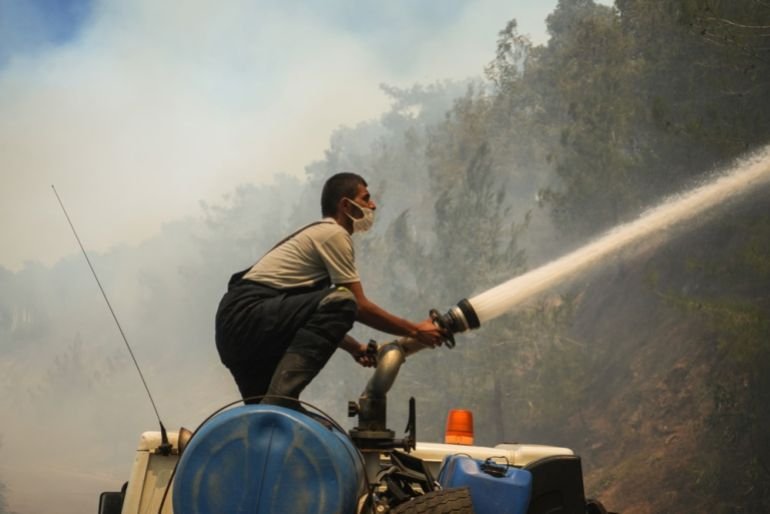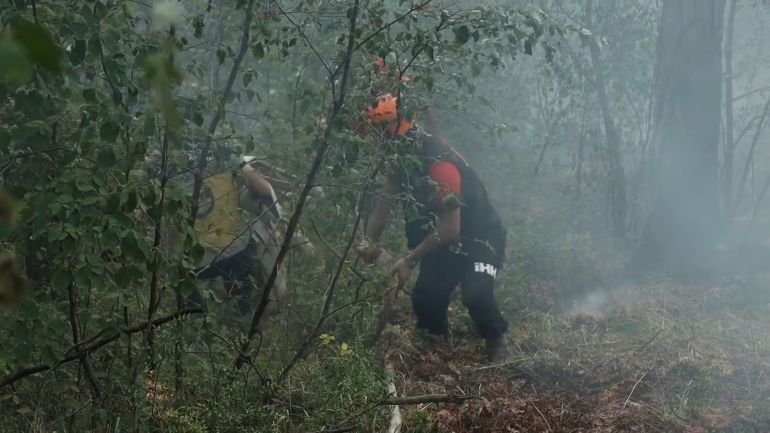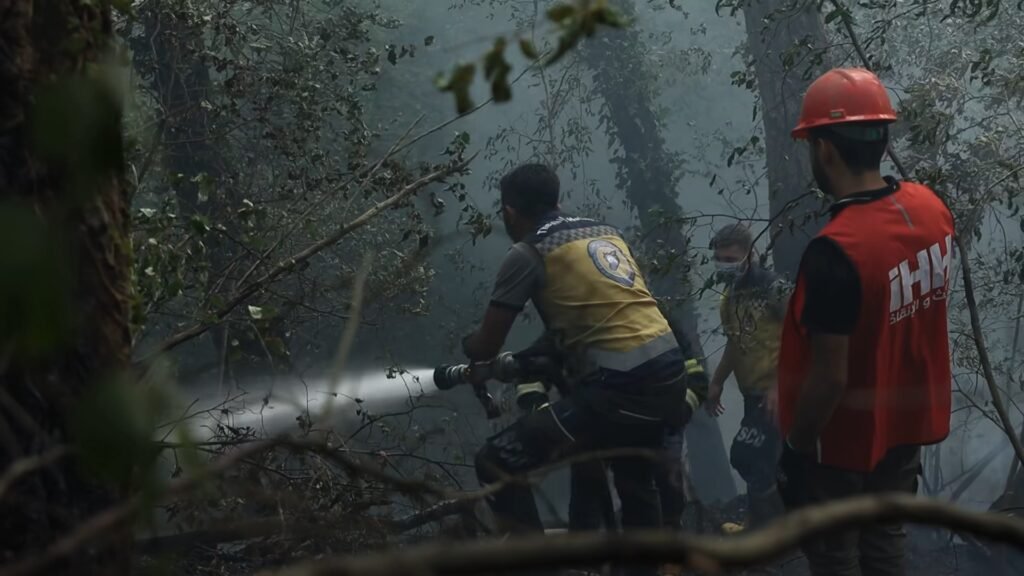Syria’s wildfires are the first major natural disaster since the country overthrew the Bashar al-Assad regime in December.
Qastal Maaf, Latakia, Syria – Abu Jameel Muhammed’s weathered hands, blackened by soot and ash, trembled as he patted the scorched earth around what remained of his beloved olive tree. At 80, the Syrian elder had survived a brutal civil war, economic collapse, and international sanctions – but the sight of his charred courtyard companion reduced him to tears.
“Villagers rescued me as flames approached my home … I survived, but my only daughter on this land was consumed by fire. It was the last thing left for me here,” Abu Jameel said haltingly, his voice breaking as he referred to the cherished tree that had graced his small home in the Qastal Maaf area of Syria’s coastal Latakia province for decades.
The elderly man lives alone in what has become the epicentre of wildfires that have ravaged Latakia for more than a week, surviving on money sent by daughters who married and moved abroad – a common story in a country where economic devastation has forced millions to seek opportunities elsewhere.
“My home was the smallest but sweetest in the village… I surrounded it with rose bushes and had one precious olive tree in the courtyard. Now all is gone,” he told media, after the blaze consumed much of his village and forced thousands into displacement.
The scene around Abu Jameel’s destroyed home reflects a broader catastrophe unfolding across Syria’s Mediterranean coast. Wildfires have consumed more than 14,000 hectares (34,600 acres) of land over the past week, according to Syria’s Minister of Emergency and Disaster Management, Raed al-Saleh, who spoke to media by phone from the front lines.
A landscape transformed by fire
The steep, narrow roads leading to villages in Latakia’s highlands are covered in layers of black mud and ash, making access treacherous for emergency vehicles fighting the wildfires, which have continued despite the best efforts of the Syrian Civil Defense.
The air is thick with acrid smoke that burns the throat and stings the eyes, while the once-green mountainsides have been transformed into a moonscape of charred earth and skeletal tree remains.
Civil Defense volunteer Muhammed Baradei, 32, emerged from a cordoned-off area in Qastal Maaf during a rare break from battling the flames.
His uniform was stained black by ash and humidity, and beads of sweat mixed with the soot covering his forehead and forearms.
“I cancelled my leave when fires started near Latakia. I came from Idlib province to help,” Baradei said, describing a roughly 100km (62-mile) journey that would have been unthinkable during Syria’s civil war, as it meant crossing the line between the regime of former President Bashar al-Assad and the opposition.
“We faced unexploded ordnance from past conflicts, steep terrain and shifting winds. Crews from multiple provinces contained many hot spots, but new fires kept igniting.”
The inferno, which broke out on July 2, has been fuelled by high temperatures reaching about 35 degrees Celsius (95 degrees Fahrenheit) and strong, dry winds characteristic of Mediterranean summers.
But this year’s fires carry particular significance for Syria, marking the first major natural disaster response since the fall of longtime dictator al-Assad, and the regime his father established more than 50 years ago, in December.
Landmines ignite fires
Beyond the immediate challenges posed by steep terrain and unpredictable winds, firefighting teams face a uniquely Syrian hazard: the deadly legacy of more than a decade of conflict.
“One of our greatest challenges was encountering unexploded ordnance and remnants of war,” said Wesam Zeidan, 29, a Civil Defense volunteer who drove from Hama province, far to the southeast of Latakia, to join the firefighting efforts. “These posed grave risks, forcing us to work with extreme caution and delaying access to affected zones.”
According to the United Nations, Syria remains one of the world’s most contaminated countries in terms of explosive remnants of war, with an estimated 11.5 million people living in areas affected by explosive hazards.
The UN also estimates that there are 300,000 landmines still spread across Syria, ready to be ignited by people unknowingly setting them off. Just between December and June, 369 people were killed as a result of what the UN terms “explosive ordnance-related accidents”, including landmines and other explosive devices left behind by the war.
These explosives can also be set off by fires raging in their vicinity. The hidden dangers, scattered across the landscape during years of fighting, now complicate every aspect of the firefighting response.
Minister al-Saleh, who joined teams on the front lines, described the scale of damage to Syria’s forests as “heart-wrenching”. According to a statement from the Ministry of Emergency and Disaster Management, at least 12 people have been injured in the firefighting efforts: 10 volunteers suffered severe exhaustion, respiratory distress, fractures or contusions, while two civilians sustained minor burns.
“During my field visits, I saw tremendous efforts to save Syria’s forests. Yet challenges grow with intense winds and buried landmines,” al-Saleh stated, highlighting the intersection of natural disaster and conflict legacy that defines much of Syria’s contemporary challenges.
Years of mounting fire risk
Syria has grappled with increasingly severe annual wildfires that have stretched the country’s sanctions-hit resources thin even as they were already strained by more than a decade of conflict.

The 2020 fires were the worst ever recorded in Syria’s history, consuming tens of thousands of hectares across multiple provinces.
This past experience, Baradei noted, drove villagers to evacuate promptly as flames approached their homes. “This significantly lowered the possibility of casualties,” he said. However, the dispersed nature of small, sometimes unofficial settlements scattered throughout the highlands has hampered firefighting efforts, he explained.
Zeidan said dense forests and a lack of firebreaks have worsened the spread. The absence of firebreaks – vegetation-free zones intentionally created within forests to block wildfire spread and provide safety areas for ground crews – has been attributed to years of governmental neglect.
“No sooner do we extinguish one fire than another ignites. Due to the dry season, unprecedented heatwaves and intense wind speeds, new hot spots keep erupting,” Zeidan said, his exhaustion evident after days of round-the-clock firefighting.
Wind speeds increased dramatically on the second day of the fires, prompting multiple Syria Civil Defense centres and firefighting units from several provinces to mobilise. While they initially controlled numerous hot spots, flames had spread to new areas by the following morning, creating a cycle of containment and reignition that has defined the past week.
‘Now the situation is different’
The change in Syria’s political landscape has fundamentally altered the firefighting response, according to volunteers and officials. During the 2011-2024 civil war, residents from opposition-controlled areas couldn’t enter government-held provinces due to security concerns and military checkpoints.
“Before the Assad regime was toppled, we couldn’t visit these forests. We didn’t care that much when we saw similar news of fires in past summers,” Baradei explained. “But now the situation is different. We are here and we have to do something.”
This newfound unity has mobilised firefighting teams from across Syria’s Civil Defense and Forestry Department. Syrian, Turkish, Jordanian and Lebanese aircraft hover above the blazes, providing aerial support for containment operations – a level of cooperation that would have been impossible under the previous government’s international isolation.
Despite the threats posed by buried landmines and unexploded ordnance scattered across the landscape from years of conflict, Baradei said morale among Civil Defense teams remains high. “We are acutely aware of how dangerous these wildfires are for Syria,” he said. “These forests are part of our shared heritage. This is precisely what drives us … because we all belong to this land.”

This piece was published in collaboration with Egab.
